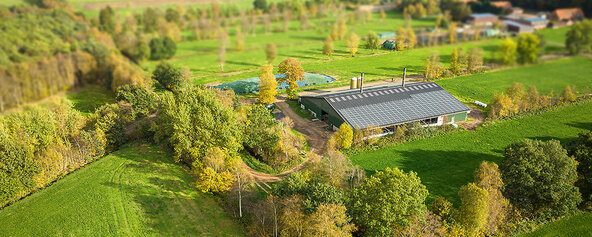
Three farms are providing the blueprint in a pilot project for climate-neutral dairy farming that is under way in Germany. The three operations are involved in Net Zero Farming, which DMK is helping to organize. The Kück family’s dairy farm in Gnarrenburg, Lower Saxony, is one of those taking part. They are among the approximately 5,200 farms producing raw milk for DMK. The Kücks decided to join the project last year, aiming to modernize their farm for the future in the hopes that their children will be able to live off the business. Net Zero involves making sensible changes to feed and energy management and growing arable fodder. It also means adopting measures to build humus in the soil, cultivate native protein crops or use feed additives to reduce methane. Scientific institutes are involved in the project, alongside a plant breeding company, a digitalization expert for milk production, an animal nutrition specialist, an agricultural trading company, a management consultancy and Mars Wrigley, a long-time DMK customer.
Because dairy farming is still a major emitter of CO2. As part of agriculture, it is one of the few industries that has not been able to reduce CO2 much since 1990, compared to the waste and energy industries, for example. That’s because post-war agriculture has mainly focused on maximizing returns, and cultivation systems and practices for raising animals developed involving high emissions levels.
Over the years, farmers optimized their processes in line with the incentives set by politicians and guided by science. That makes changing the system doubly challenging, in practical terms as farms need to continue to be able to make a living, but also psychologically, because farmers wind up asking themselves: Have we been doing everything wrong up until now?
It is not as simple as that. You have to consider the circumstances, because the system that emerged over the last 70 years has made a decisive contribution to the nation’s food security. But it also caused collateral damage to the environment. So we have reached a point that some are calling an agricultural transformation, or a systemic change. Now, we have to learn in a new way, to find answers to the big questions, namely environmental protection and biodiversity.
It is more complicated than that. Mathematically it would work out, and it’s the basis for some of the measures the German government is pursuing. They are talking about reducing the number of animals by 30 percent. But the tricky thing is that when it comes to consumer eating habits, shoppers are still highly focused on animal products. Transforming agriculture presupposes consumers will also change their behavior. But this change in terms of eating habits is only happening very slowly indeed.
For agriculture, my guess is that it will take a very long time, like the food revolution, for example. After all, these are sea changes. As a society, we have to be honest. One glass of cow’s milk is the equivalent to six minutes of streaming online, in terms of its carbon footprint. That shows us where we as individuals or households are creating problems. We cannot just point to the energy, construction and agricultural sectors and demand they change. We as consumers have to change too.
You cannot compare the two. With the energy transition, Germany has a handful of large companies on the utility and grid operator side. But when it comes to agriculture in this country, we have around 170,000 farms that depend on animals. Changing agriculture is going to require a very careful process of development and transition. My message to politicians is: Bear in mind that the change is going to need to be managed at field level. After all, 170,000 farms are not nothing. We need to proceed with great care and ensure stability when it comes to land management so if things become difficult, Germany can maintain the same level of self-sufficiency. And also, it is about preserving knowledge. Some people imagine that drones will fly over fields and automatically run farms better than farmers can. That is a misconception.
When I look at the young farmers I work with, I see highly competent agricultural managers. Few occupational groups are more adaptable than farmers – provided they are clear about where they are heading and have enough stability and legal clarity to be able to plan. If all that is in place, I’m not worried that fields might wind up lying fallow.
